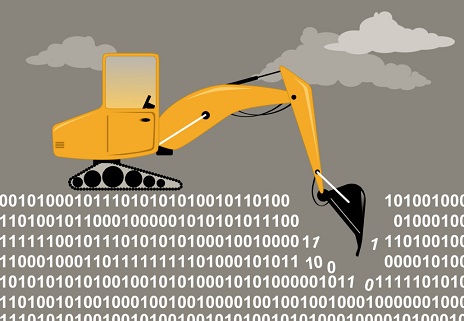Misinterpreting Data Aggregators

We live in a digital age
Even with all the databases and algorithms and AI and everything else, there is still exponentially more data than we know what to do with. That's because raw data can be theoretically organized in an infinite number of ways and we can arrive at an infinite number of conclusions based on that data.
In the capitalistic system we live in today, most data and even more organizations of that data are rendered completely useless. That's because a capitalist system needs to not only find value in this infinite swath of ones and zeros, but more importantly, it needs to capture that value and funnel it into the pockets of the developers. That's a very small subset of the sum total of data we have access to.
An example of this would be a social media website tracking our interests and then feeding us targeted advertising where we are much more likely to take the bait and buy the thing. There are so many other things they could be looking at, but the focus is where the profit can be made.
Would it be smart to perhaps track the bullies and flag threatening behavior? That's a highly secondary motive that's not going to get any attention unless the blowback becomes a problem. And in that case once again the only reason to do it is to mitigate the financial losses of that blowback, not because it's good for society.
The ultimate example of our system doing us dirty is almost certainly the medical industry. Anything in medicine that can't generate a profit is labeled scientific quackery and given no funding. Specifically: that means plants don't get studied very often because plants can't be patented (unless they are GMO lab-created).
Just look at how we 'cure' cancer.
We juice up the patient with poison and we hope that the poison kills the cancer before killing the patient. And the worst part is everyone just accepts that this is the best option, even though there is obviously a better option out there that we aren't even looking for because it's not as profitable. Very sad and downright disappointing.

Crypto fixes this.
Crypto allows society to be rebuilt with new incentives. When a community (or even a corporation) can gain direct access and control of a currency, the entire game changes. All of a sudden ALL value that gets created is immediately captured by the underlying currency. Developers no longer have to worry about capturing value given certain scenarios:
- The community subsidizes their work (@hive.fund does this).
- The developer has a big enough stake in the currency to make it more than worth building value and only gaining a small fraction of that value for themselves.
- The developer will gain a huge amount of reputation from building value which will in turn act as an investment that will pay off in the long run.
- The developer doesn't really care about making money because the underlying network has already made them fabulously wealthy or it is simply a passion project (basically altruism).

Can't rely on altruism.
While it's a nice thought that everyone will give what they can and only take what they need, that's simply just not how the world operates. To be fair, many good things have been done with charity and people rising up and giving without taking anything in return, but to rely on this would be a fatal mistake. Any platform that relies on altruism is destined to fail and will always be taken advantage of by the viruses, parasites, and takers of this world.
Rather, incentives must align in such a way that crypto pays citizens for doing the things society wants them to do. With access to smart/programmable money, the tool-chest is greatly expanded and many more ways of accomplishing this goal are opened up.
Misinterpreting the data
To be honest, this post was supposed to be about crypto price data aggregation, and HBD specifically. When something like coinmarketcap or coingecko tell us that HBD is worth $1.05 or $0.95... this guess from the data aggregation sites has been incorrect for a long long time now (maybe over a year), but yet I still see people looking at this number like it means something. The blind trust of centralized websites is alarming.
How do crypto aggregation sites work?
- They take an average of all the data available.
- The average price of all liquidity pools is output.
- Usually this works out just fine.
- With HBD it's always wrong.
- Why?

Because they aren't accessing the correct data.
The only liquidity pools the aggregators are using for HBD are Upbit and Bittrex, and Bittrex has been broken for months, while Upbit isn't even accessible unless located in South Korea (and even then the gap between buyers and sellers is 7%, which is wholly unacceptable for a stable coin). The real liquidity for HBD exists on the internal market and the wrapped pool on Polygon. This means that the listed price of HBD on data aggregation sites is always wrong unless it just happens to be correct on accident.
And still I see people on Discord being like, "HBD is 95 cents".
Interesting theory.
Go try to buy some at that price.
See what happens.
There are infinite ways to get it wrong.
That's the thing about organizing data. There are a million ways to get it wrong and only a handful of ways to thread the needle and extract useful information from the raw dataset.
Conclusion
Certainly there's a lot more to be said about this issue, but I seem to be tapped out at the moment. I suppose the main point to be made here is that data capture, organization, and profitization, is largely a thing that just happens in the background that most people don't even give a second thought. This is a very strange happenstance considering how important these things are in a digital age. Just like we don't think about our next heartbeat or our next breath we're going to take or the food we are about to digest, so too must most things in our world go ignored or we will be overwhelmed with a massive dataset that our brains have no way to organize in any kind of helpful manner. The data overload is real.
Posted Using LeoFinance Beta
!LUV the post
Posted Using LeoFinance Beta
@heruvim1978(1/5) gave you LUV. H-E tools | discord | community | <><
H-E tools | discord | community | <><
HiveBuzz.me NFT for Peace
What's the reason that literally nobody will list HBD?
Especially those smaller exchanges that have already listed HIVE?
Posted Using LeoFinance Beta
I imagine it's a liquidity issue paired with some other random overhead costs.
Although like you said the overhead costs should be dirt cheap because they already list hive. at the end of the day HBD isn't actually needed for anything and demand is very low with a market cap of rank of #5000.
We need more dapps to utilize hbd to increase demand enough to get the listings.
Very chicken and egg scenario.
need liquidity to get liquidity
takes money to make money
It is indeed true that the biggest problem with the modern world is that the objectivity and appropriateness of advances is compromised by mere economic interest, but to some extent, I think it should not surprise us, the world has always been a place where the big fish eat the small fish, and there are millions of examples of this in history.
The hope, as you said, lies in the crypto world; insofar as it is capable of breaking that vicious circle (well known) that we mentioned before. But, as you rightly said, we cannot rely on the mere altruism of people or projects, so the key is to generate added value, a value that both in society and in projects generates economic wealth naturally. That, from my point of view, is the main thing here.
As for the rest, people value HBD just like they do other cryptos, they just go to Coinmarketcap or Coingecko or Coin360 and view the price. They see the price but not the value, they understand the monetary cost of the moment, but not the true value of the project and crypto over time; so they cannot escape the mirage of the liquidity of the moment.
I found your post very interesting. It made me think about many important questions. Thanks for sharing.
Posted Using LeoFinance Beta
Interesting but I didn't like the stereotype part about science and the pharma industry. It's not all that bad as you describe. Cancer can be cured in many cases, when a few years ago couldn't. Who claims to cure with plants is not labeled as quackery just because it doesn't make profit (oh they do trust me!), but because their treatment cannot be measured. They rely (and often exploit) the hopes of their patients. And behind these alternative treatments, often other pharma companies hide... Take homeopathy. It's advertised as the most natural treatment, the one that can free you from dependence on big pharma, but when you go to check the producers of homeopathic products (all but natural) you will see they are still big pharma. In the US, they even have their own aggressive lobby.
What do I want to say with this? That we must get rid of stereotypes and absolutes. Maybe nobody is completely good, but nobody is completely bad either. Modern medicine is full of astonishing accomplishments, without which, probably many of us wouldn't be here to complaint about it on social media. Corruption in the research system does exist, but not on the scale you imagine ("I must find the result that fits my narrative" - it's not that easy, the peer review system is there to prevent this from happening). Do not let the few bad apples make you hate all the apples in the basket! ;)
That internal market Amm for hbd is still very much needed in my opinion.